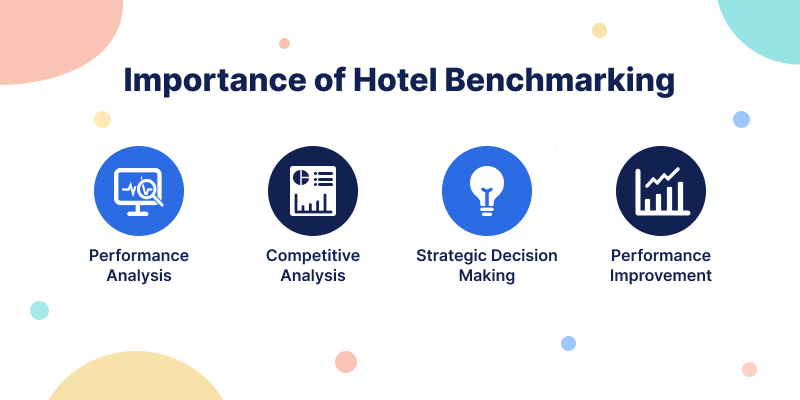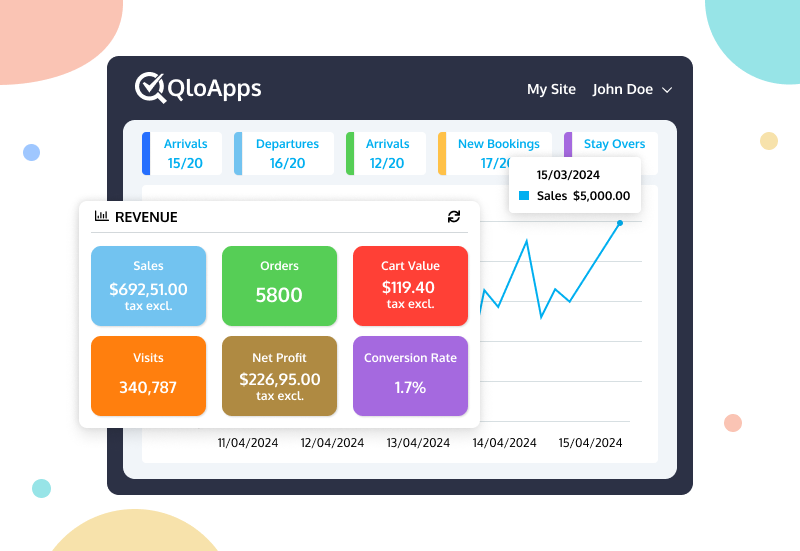In the hotel business, comparing how well you’re doing against other hotels is important. It helps hotel owners see what they’re doing well, and where they need to get better and contributes to providing the best hotel guest services.
Hotels can learn a lot by looking at how they’re doing compared to industry standards and other hotels. This helps them make smart decisions and run their hotels well.
In this complete guide, we’ll talk about the basics of hotel benchmarking. We’ll look at why it’s important, how it’s done, and the best ways to do it.
What is Hotel Benchmarking?
Hotel benchmarking means comparing how well a hotel is doing with things like how much money it’s making, how many rooms are being used, how much guests are paying on average, and how happy guests are, to what other hotels are doing.
Hotel owners can grow by adopting hotel benchmarking and see how well they’re doing compared to what’s normal for the industry. This helps them figure out what they’re good at and where they need to do better.
Benchmarking gives hotels a way to measure how well they’re doing using numbers. This helps hotels set goals for getting better that they can reach.
Importance of Hotel Benchmarking
Performance Analysis
Hotel benchmarking helps hotel owners see how they’re doing in different areas like running the hotel and making money.

By looking at how they’re doing compared to other hotels, hotels can see where they’re not doing as well and do things to make the hotel run better and make more money.
Competitive Analysis
Analytical data can improve hotel revenue and hotels see how they’re doing compared to other hotels. By looking at things like how much other hotels charge, how many rooms they have booked, and how happy their guests are, hotels can understand what’s happening in the market and change their plans to stay ahead.
Strategic Decision-Making
Benchmarking gives hotels useful information from data that helps them make smart decisions. Whether it’s deciding how much to charge for rooms, where to spend money on advertising, or what upgrades to make to the hotel, benchmarking helps hotel owners make choices that will help them do well in the long run.
Performance Improvement
By comparing themselves to what’s normal in the industry and what works well, hotels can see where they can get better. Then they can do things to make the hotel work better.
Whether it’s making more money from room sales, making guests happier, or making how the hotel works smoother, benchmarking helps hotels keep getting better.
Methodologies of Hotel Benchmarking
Internal benchmarking means comparing how well different parts of the same hotel group are doing. This helps hotel owners find out what works best and share ideas to make the whole hotel group better.
Competitive benchmarking is when hotels look at how well they’re doing compared to other hotels that are similar to them in the same area.
By looking at how well other hotels are doing, hotels can see what they’re good at and what they need to work on. This helps them find ways to stand out from other hotels.
Industry benchmarking means comparing how well a hotel is doing to what’s normal in the hotel industry. This helps hotels see where they’re doing well and where they need to improve compared to other hotels.
Best Practices for Hotel Benchmarking
Define Key Performance Indicators (KPIs)
Figure out the important hospitality KPIs to measure how well your hotel is doing. These could include how many rooms are being used, the average price for a room, how much money you’re making per room, and how happy guests are.
Choose Relevant Benchmarking Data
Choose where you get your comparison data from based on who your hotel serves and where it’s located. This way, the comparisons will help you make decisions that matter for your hotel.

Regularly Monitor Performance
Set a schedule to check how well the hotel is doing and compare it to others regularly. This helps hotel owners see if things are getting better or worse over time and know when they need to make changes because of what’s happening in the market.
Conduct In-Depth Analysis
Look closely at the comparison data using tools like Google Analytics to find out why the hotel isn’t doing as well as others and where there are chances to make things better.
Whether it’s looking at what guests say, checking out what other hotels are doing, or looking at the money side of things, really looking into the details is important to figure out what to do next.
Benchmark Across Multiple Dimensions
Don’t always look at money-related numbers when comparing but also, check how happy guests are, how hard employees work, and how well things run. Also in today’s world hotelier should focus on making their hotel eco-friendly for a green environment.
Implement Continuous Improvement Initiatives
Use what you learn from comparing to make plans to make things better. This could mean giving staff better training, getting better technology, or making guests happier. It’s important to keep making things better to stay ahead in the hotel business.
Conclusion
Hotel benchmarking is useful for hotel owners to see how well they’re doing, find ways to get better, and make sure their hotel does well in the long run.
By looking at important numbers and comparing them to what’s normal for the industry and other hotels, hotels can learn useful things that help them make smart choices and run their hotel well.
Using the best ways to compare helps hotels do better, make more money, and give guests really good experiences, especially in a market where competition is tough.
Get In Touch With Us!
If you are a hotel owner and looking for Free hotel booking software. Then QloApps is the best solution for you.
QloApps offers various features to enhance your hotel business. Such as Virtual tours, Tours and Packages, Channel Manager, Front Desk, Cloud PMS, 100+ Add-ons, and many more.
To get started with this user-friendly software. Just download it and add your property on QloApps.
If you have any suggestions, you can share them on the QloApps forum.
For any technical assistance, kindly raise a ticket.

Be the first to comment.